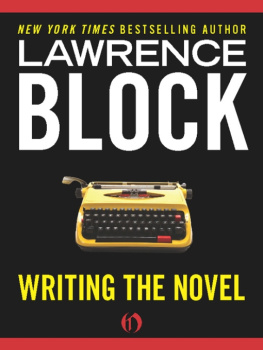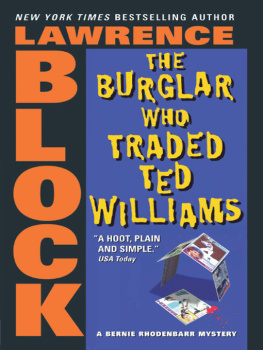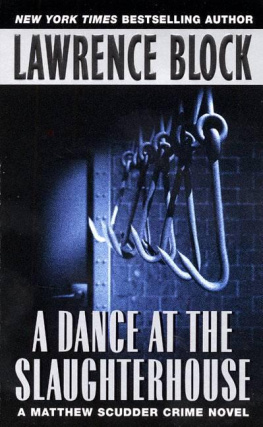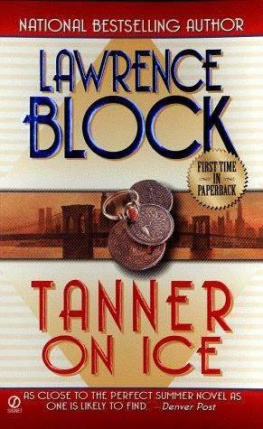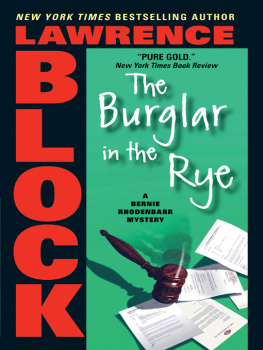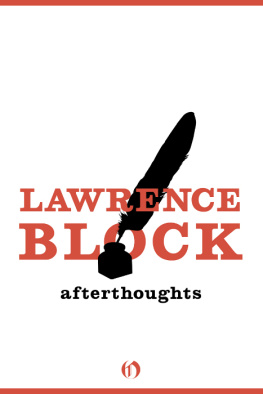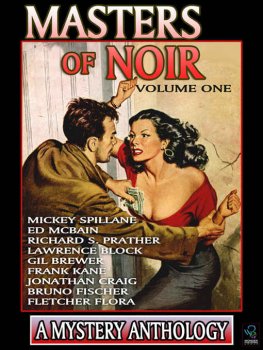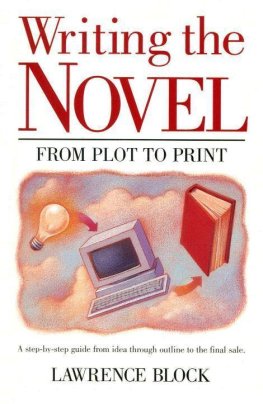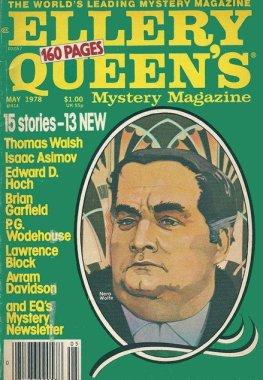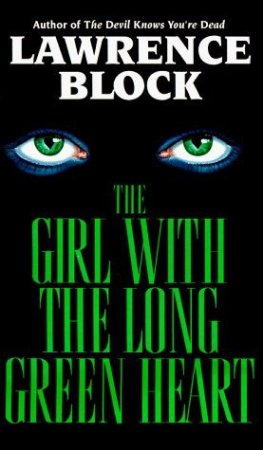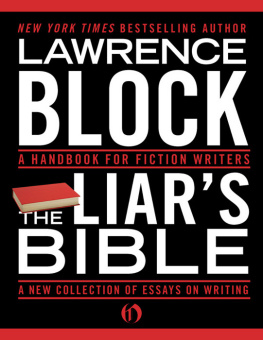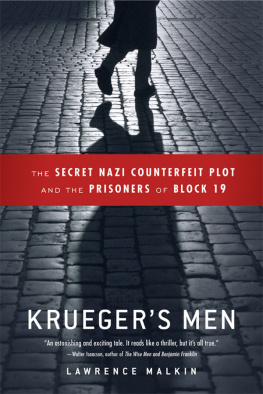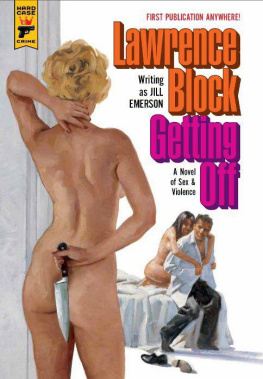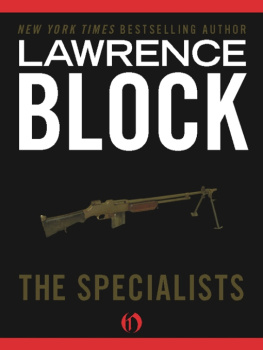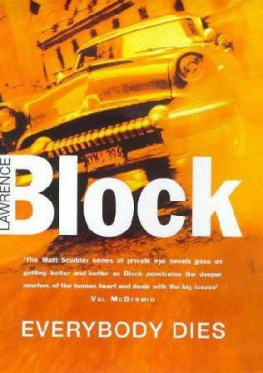Lawrence Block - Writing the Novel: From Plot to Print
Here you can read online Lawrence Block - Writing the Novel: From Plot to Print full text of the book (entire story) in english for free. Download pdf and epub, get meaning, cover and reviews about this ebook. year: 2010, publisher: Open Road, genre: Detective and thriller. Description of the work, (preface) as well as reviews are available. Best literature library LitArk.com created for fans of good reading and offers a wide selection of genres:
Romance novel
Science fiction
Adventure
Detective
Science
History
Home and family
Prose
Art
Politics
Computer
Non-fiction
Religion
Business
Children
Humor
Choose a favorite category and find really read worthwhile books. Enjoy immersion in the world of imagination, feel the emotions of the characters or learn something new for yourself, make an fascinating discovery.
- Book:Writing the Novel: From Plot to Print
- Author:
- Publisher:Open Road
- Genre:
- Year:2010
- Rating:4 / 5
- Favourites:Add to favourites
- Your mark:
- 80
- 1
- 2
- 3
- 4
- 5
Writing the Novel: From Plot to Print: summary, description and annotation
We offer to read an annotation, description, summary or preface (depends on what the author of the book "Writing the Novel: From Plot to Print" wrote himself). If you haven't found the necessary information about the book — write in the comments, we will try to find it.
Writing the Novel: From Plot to Print — read online for free the complete book (whole text) full work
Below is the text of the book, divided by pages. System saving the place of the last page read, allows you to conveniently read the book "Writing the Novel: From Plot to Print" online for free, without having to search again every time where you left off. Put a bookmark, and you can go to the page where you finished reading at any time.
Font size:
Interval:
Bookmark:
Writing the Novel: From Plot to Print
Lawrence Block

Lawrence Block (b. 1938) is the recipient of a Grand Master Award from the Mystery Writers of America and an internationally renowned bestselling author. His prolific career spans over one hundred books, including four bestselling series as well as dozens of short stories, articles, and books on writing. He has won four Edgar and Shamus Awards, two Falcon Awards from the Maltese Falcon Society of Japan, the Nero and Philip Marlowe Awards, a Lifetime Achievement Award from the Private Eye Writers of America, and the Cartier Diamond Dagger from the Crime Writers Association of the United Kingdom. In France, he has been awarded the title Grand Maitre du Roman Noir and has twice received the Societe 813 trophy.
Born in Buffalo, New York, Block attended Antioch College in Yellow Springs, Ohio. Leaving school before graduation, he moved to New York City, a locale that features prominently in most of his works. His earliest published writing appeared in the 1950s, frequently under pseudonyms, and many of these novels are now considered classics of the pulp fiction genre. During his early writing years, Block also worked in the mailroom of a publishing house and reviewed the submission slush pile for a literary agency. He has cited the latter experience as a valuable lesson for a beginning writer.
Blocks first short story, You Cant Lose, was published in 1957 in Manhunt, the first of dozens of short stories and articles that he would publish over the years in publications including American Heritage, Redbook, Playboy, Cosmopolitan, GQ, and the New York Times. His short fiction has been featured and reprinted in over eleven collections including Enough Rope (2002), which is comprised of eighty-four of his short stories.
In 1966, Block introduced the insomniac protagonist Evan Tanner in the novel The Thief Who Couldnt Sleep. Blocks diverse heroes also include the urbane and witty booksellerand thief-on-the-sideBernie Rhodenbarr; the gritty recovering alcoholic and private investigator Matthew Scudder; and Chip Harrison, the comical assistant to a private investigator with a Nero Wolfe fixation who appears in No Score, Chip Harrison Scores Again, Make Out with Murder, and The Topless Tulip Caper. Block has also written several short stories and novels featuring Keller, a professional hit man. Blocks work is praised for his richly imagined and varied characters and frequent use of humor.
A father of three daughters, Block lives in New York City with his second wife, Lynne. When he isnt touring or attending mystery conventions, he and Lynne are frequent travelers, as members of the Travelers Century Club for nearly a decade now, and have visited about 150 countries.

A four-year-old Block in 1942.

Block during the summer of 1944, with his baby sister, Betsy.

Blocks 1955 yearbook picture from Bennett High School in Buffalo, New York.

Block in 1983, in a cap and leather jacket. Block says that he later lost the cap, and some son of a bitch stole the jacket. Dont even ask about the hair.

Block with his eldest daughter, Amy, at her wedding in October 1984.

Seen here around 1990, Block works in his office on New Yorks West 13th Street with, he says, a bad haircut, an ugly shirt, and a few extra pounds.

Block at a bookstore appearance in support of A Walk Among the Tombstones, his tenth Matthew Scudder novel, on Veterans Day, 1992.

Block and his wife, Lynne.

Block and Lynne on vacation someplace exotic.

Block race walking in an international marathon in Niagara Falls in 2005. He got the John Deere cap at the John Deere Museum in Grand Detour, Illinois, and still has it today.
For Miss May Jepson, my 11th Grade English teacher at Bennett High School in Buffalo, New York, who first encouraged me to become a writer;
For my mother and father, whose support toward that end was unflagging;
For John OHara, Evan Hunter, Fredric Brown, W. Somerset Maugham, Rex Stout, Dashiell Hammett, James T. Farrell, Thomas Wolfe, and so many more writers from whom Ive learned so much of what I know;
For Nolan Miller, whose writing workshop at Antioch College was my nursery;
For John Brady, who encouraged me to write about writing;
For my daughters, Amy and Jill and Alison, who can be whatever they want in this world;
For Bill and all his friends, who have shared their experience, strength and hope;
And for Mary Pat, with all my love.
Acknowledgments
Before this present volume was in the planning stages, I circulated a questionnaire on writing methods with the intention of doing a magazine piece on the subject. A large number of writers of fiction and nonfiction alike were kind enough to reply at some length. While my article was not ultimately published, the replies to my questionnaire were of inestimable value to me when it came time to write this book on the novel. Ive had occasion to quote from several of the replies I received; all of them in one way or another enlarged my understanding of how writers do whatever it is that we do.
This books defects are mine alone. For its strengths, I should like to acknowledge the assistance of all those who replied to my questionnaire, to wit:
Mary Amlaw, Poul Anderson, Mel Arrighi, Isaac Asimov, Michael Avallone, Jean L. Backus, Eugene Franklin Bandy, D.R. Benson, Robert Bloch, Murray Teigh Bloom, Barbara Bonham, Jon L. Breen, William Brittain, Barbara Callahan, William E. Chambers, Thomas Chastain, John Cheever, Mary Higgins Clark, Virginia Coffman, George Harmon Coxe, Linda Crawford, Clive Cussler, Dorothy Salisbury Davis, Richard Deming, F.M. Esfandiary, Stanley Ellin, Harlan Ellison, Robert L. Fish, Patricia Fox-Sheinwold, Lucy Freeman, Anne Freemantle, Tonita S. Gardner, Brian Garfield, Herbert Gold, Arthur Goldstein, Joe Gores, Marilyn Gran-beck, Russell H. Girran, Irving A. Greenfield, Isidore Haiblum, Joseph Hansen, Joyce Harrington, Tony Hillerman, Edward D. Hoch, Peter Hochstein, James Holding, Hans Holzer, Dorothy B. Hughes, Beatrice Trum Hunter, Bel Kaufman, Richard Kostelanetz, Eda J. LeShan, Elizabeth Levy, Robert Ludlum, John Lutz, Arthur Lyons, Arthur Maling, Harold Q. Masur, John D. MacDonald, Ross Macdonald, Gregory McDonald, Thomas M. McDade, Patricia McGerr, William P. McGivern, James McKimmey, Francis M. Nevins, Donald Newlove, Stephen R. Novak, Al Nussbaum, Dennis ONeil, Robert B. Parker, Don Pendleton, Judson Philips, Richard S. Prather, Bill Pronzini, Tom Purdom, Robert J. Randisi, Malcolm Robinson, Willo Davis Roberts, Sam Ross, Sandra Scoppettone, Justin Scott, Henry Slesar, Martin Cruz Smith, Jerry Sohl, Jane Speed, Aaron Marc Stein, Richard Martin Stern, Ross Thomas, Lawrence Treat, Louis Trimble, Thomas Walsh, Stephen Wasylyk, Hillary Waugh, Sol Weinstein, Edward Wellen, Helen Wells, David Westheimer, Donald E. Westlake, Collin Wilcox and Chelsea Quinn Yarbro.
Next pageFont size:
Interval:
Bookmark:
Similar books «Writing the Novel: From Plot to Print»
Look at similar books to Writing the Novel: From Plot to Print. We have selected literature similar in name and meaning in the hope of providing readers with more options to find new, interesting, not yet read works.
Discussion, reviews of the book Writing the Novel: From Plot to Print and just readers' own opinions. Leave your comments, write what you think about the work, its meaning or the main characters. Specify what exactly you liked and what you didn't like, and why you think so.

